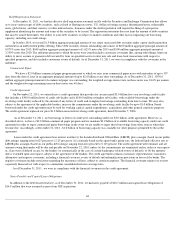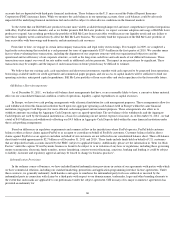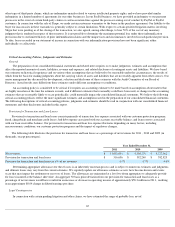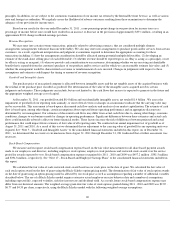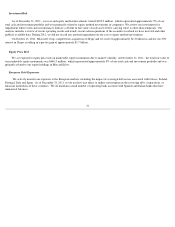eBay 2011 Annual Report Download - page 73
Download and view the complete annual report
Please find page 73 of the 2011 eBay annual report below. You can navigate through the pages in the report by either clicking on the pages listed below, or by using the keyword search tool below to find specific information within the annual report.
accounts that are deposited with third party financial institutions. These balances in the U.S. may exceed the Federal Deposit Insurance
Corporation (FDIC) insurance limits. While we monitor the cash balances in our operating accounts, these cash balances could be adversely
impacted if the underlying financial institutions fail and could be subject to other adverse conditions in the financial markets.
To the extent that our Bill Me Later products become more widely available through improved and more comprehensive product integrations
with eBay, PayPal and other channels, and as we further promote Bill Me Later products, we expect customer adoption and usage of Bill Me Later
products to expand. Any resulting growth in the portfolio of Bill Me Later loan receivables would increase our liquidity needs and any failure to
meet those liquidity needs could adversely affect the Bill Me Later business. We currently fund the expansion of the Bill Me Later portfolio of
loan receivables with borrowings and domestic and international cash resources.
From time to time, we engage in certain intercompany transactions and legal entity restructurings. For example, in 2009, we completed a
legal entity restructuring that resulted in a cash payment for taxes of approximately $207.4 million in the first quarter of 2010. We consider many
factors when evaluating these transactions, including the alignment of our corporate structure with our organizational objectives and the
operational and tax efficiency of our corporate structure, as well as the long-term cash flows and cash needs of our different businesses. These
transactions may impact our overall tax rate and/or result in additional cash tax payments. The impact in any period may be significant. These
transactions may be complex and the impact of such transactions on future periods may be difficult to estimate.
We believe that our existing cash, cash equivalents and short-
term investments, together with cash expected to be generated from operations,
borrowings available under our credit agreement and commercial paper program, and our access to capital markets will be sufficient to fund our
operating activities, anticipated capital expenditures, Bill Me Later portfolio of loan receivables and stock repurchases for the foreseeable future.
Off-Balance Sheet Arrangements
As of December 31, 2011 , we had no off-balance sheet arrangements that have, or are reasonably likely to have, a current or future material
effect on our consolidated financial condition, results of operations, liquidity, capital expenditures or capital resources.
In Europe, we have two cash pooling arrangements with a financial institution for cash management purposes. These arrangements allow for
cash withdrawals from this financial institution based upon our aggregate operating cash balances held in Europe within the same financial
institution (Aggregate Cash Deposits) for more efficient cash management and investment purposes. These arrangements also allow us to
withdraw amounts exceeding the Aggregate Cash Deposits up to an agreed-upon limit. The net balance of the withdrawals and the Aggregate
Cash Deposits are used by the financial institution as a basis for calculating our net interest expense or income. As of December 31, 2011
, we had
a total of $4.9 billion in cash withdrawals offsetting our $4.9 billion in Aggregate Cash Deposits held within the same financial institution under
these cash pooling arrangements.
Based on differences in regulatory requirements and commercial law in the jurisdictions where PayPal operates, PayPal holds customer
balances either as direct claims against PayPal or as an agent or custodian on behalf of PayPal's customers. Customer balances held as direct
claims against PayPal or as an agent or custodian on behalf of our customers are not reflected in our consolidated balance sheet. These off-
balance
sheet funds totaled approximately $2.7 billion as of December 31, 2011 and 2010 . These funds include funds held on behalf of U.S. customers
that are deposited in bank accounts insured by the FDIC (subject to applicable limits). Additionally, please see the information in "Item 1A: Risk
Factors" under the caption "If our Payments business is found to be subject to or in violation of any laws or regulations, including those governing
money transmission, electronic funds transfers, money laundering, counter-terrorist financing, sanctions, banking and lending, it could be subject
to liability, licensure and regulatory approval and may be forced to change its business practices".
Indemnification Provisions
In the ordinary course of business, we have included limited indemnification provisions in certain of our agreements with parties with which
we have commercial relations, including our standard marketing, promotions and application-programming-interface license agreements. Under
these contracts, we generally indemnify, hold harmless and agree to reimburse the indemnified party for losses suffered or incurred by the
indemnified party in connection with claims by a third party with respect to our domain names, trademarks, logos and other branding elements to
the extent that such marks are applicable to our performance under the subject agreement. GSI in many of its major ecommerce agreements has
provided an indemnity for
66










